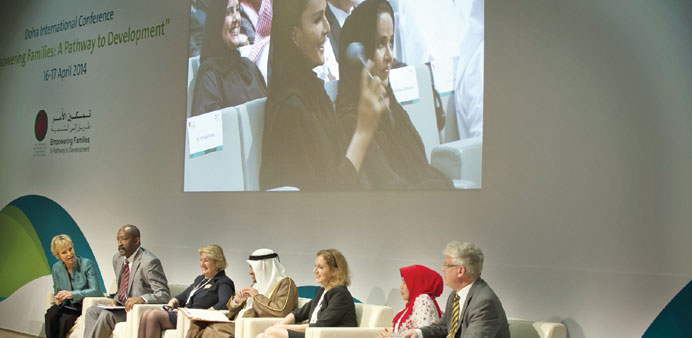Humanity at the moment greatly needs comprehensive global, national policies and programmes that are geared towards family issues as an integrated social system without fragmenting solutions,” HH Sheikha Moza bint Nasser, chairperson of Qatar Foundation for Education, Science and Community Development, stressed yesterday.
She was delivering the opening address at the Doha International Conference, “Empowering Families: A pathway to Development”, which mainly deals with the significance and vitality of families for healthy societies.
The two-day event, organised by the Doha International Family Institute, further examines the gains and losses of the family institution in the process of modernisation across different parts of the world from various perspectives. The participants are global and regional experts and major stakeholders in the field.
HH Sheikha Moza welcomed the participants and commended their continuous determination towards family issues at the conference.
“I see that the present conference is an appropriate opportunity to carry out an elaborate review of the accomplishments for two decades at the level of legislation, policies, applications and real changes,” she said.
“We behold that the issues of men, women, youth and the child is a single issue: which is the issue of family with its own array of challenges and problems. An issue that starts with the development of minds and requires empowering all family members of their roles. Family empowerment in this sense is to create the conditions for the advancement of the roles in a coherent family that preserves and inherits the values of cohesion.”
However, she explained that “the larger role falls on the state, through fixing policies and programmes that work to save education and healthcare, addressing the causes of poverty, supporting the balance between life and work, and upholding the values of solidarity and communication between generations”.
Meanwhile, she stressed that each society has its own particular characteristics and values and these should be taken into consideration when designing such appropriate programmes.
HH Sheikha Moza explained the high importance of family as sacred and the main nucleus in the Arab world. “We, as Arabs and Muslims, have a religious, cultural and social heritage that sanctifies the relationship between parents and children and honours the values that maintain cohesion, solidarity and compassion among family members,” she said.
“Cultural invasion has targeted the core of the identity of the Arab family: its culture, language and religion. The media and entertainment culture has played the most influential role in carrying the terms and consequences of this invasion, which has affected many of the Arab youth. We hurt deeply as we see young Arabs losing their identity, cases that blow the siren, lest this domination permeate future generations.”
She regretted that “Arab countries are preoccupied by political disputes or internal conflicts, ignoring their duties toward building and developing society. Perhaps no other region in the world is quite like most Arab countries, whose budgets are drained through armaments, security requirements and media propaganda”.
HH Sheikha Moza stressed that “the most shocking is that some Arab countries fund and support hundreds of satellite channels that contribute to the flattening of the Arab mind, manipulating the instincts of youth. This warns us about our losing bet with the future”.
She concluded that “it will always be evident that our nation will not advance toward a praiseworthy future if it did not protect the inherent values of the family, and if the youth did not enjoy the moral firmness against behavioural abnormalities and cultural immunity against the temptations of the products and media of the cultural invasion that flattens their minds”.
The conference will address various mechanisms on how to place family issues at the heart of the agenda of policy and decision makers and accordingly devise adequate mechanisms to implement these.

